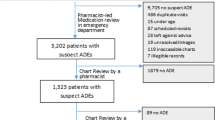Summary
Within an ongoing drug surveillance program in psychiatric hospitals the applicability of an algorithm for judgment on probability of causal relationship of adverse events and drug therapy was tested. Algorithmic interrater agreement was compared to agreement obtained with the conventional criteria used so far within the program in 80 cases by two raters, who had participated in the drug surveillance program since its beginning in 1979. With the use of the algorithm raters agreed on imputed drugs in 86% of all cases; total agreement on drugs and degree of probability was obtained in 69% (weighted kappa 0.618). Raters agreed on total score for the imputed medication in 49% and also on all subscores for the different axes of the algorithm in 43% of all cases.
Differentiation of drug-related from illness-related changes, the use of judgmental terms within the algorithm and specific problems created by the frequent use of combinations of drugs with similar profiles of adverse drug reactions (ADR) in psychiatric patients were identified as the main sources of disagreement. Agreement on total judgment was comparable to results from similar studies in the literature using various algorithms, but in contrast to all these studies a higher percent of agreement (80%) was obtained with the use of the conventional criteria in this study.
Similar content being viewed by others
References
Albin H, Begaud B, Boisseau A, Dangoumau J (1980) Validation des publications d'effets indésirables par une methode d'imputabilité. Thérapie 35:571–576
Begaud B, Boisseau A, Albin H, Dangoumau J (1978) Imputabilité des effets indésirables des médicaments. Étude de 194 observations. Thérapie 33:383–389
Begaud B, Boisseau A, Dangoumau J (1981) Comparaison de quatre méthodes d'imputabilité des effets indésirables des médicaments. Thérapie 36:65–70
Begaud B, Pere JC, Dangoumau J (1981) Mise en oeuvre d'un critére: la bibliographic. Thérapie 36:233–236
Blanc S, Leuenberger P, Berger JP, Brocke E, Schelling JL (1979) Judgments of trained observers on adverse drug reactions. Clin Pharmacol Ther 25:493–498
Boisseau A, Begaud B, Albin H, Dangoumau J (1980) Réévaluation du diagnostic d'effet indésirable des médicatments avec un recul de six mois. Thérapie 35:577–580
Busto U, Naranjo CA, Sellers EM (1981) Comparison of two recently published algorithms to assess the probability of adverse drug reactions. Clin Pharmacol Ther 32:236
Cohen J (1968) Weighted kappa: Nominal scale agreement with provision for scaled disagreement or partial credit. Psychol Bull 70:213–220
Dangoumau J, Begaud B, Boisseau A, Albin H (1980) Diagnostic des effets indésirables des médicaments (appréciations comparées de cliniciens et de pharmacologues cliniciens). Nouv Presse Med 9:1607–1609
Dangoumau J, Evreux JC, Jouglard J (1978) Méthode d'imputabilité des effets indésirables des médicaments. Thérapie 33:373–381
Grohmann R, Hippius H, Mueller-Oerlinghausen B, Ruether E, Scherer J, Schmidt LG, Strauss A, Wolf B (1984) Assessment of adverse drug reactions in psychiatric hospitals. Eur J Clin Pharmacol 26:727–734
Grohmann R, Strauss A, Gehr C, Ruether E, Hippius H (1980) Zur Praxis der klinischen Therapie mit Psychopharmaka. Pharmakopsychiatr 13:1–19
Hurwitz N, Wade OL (1969) Intensive hospital monitoring of adverse reactions to drugs. Br Med J 1:531–536
Hutchinson TA, Leventhal JM, Kramer MS, Karch FE, Lipman AG, Feinstein AR (1979) An algorithm for the operational assessment of adverse drug reactions. II. Demonstration of reproducibility and validity. JAMA 242:633–638
Hutchinson TA, Flegel KM, Ho Ping Kong H, Bloom WS, Kramer MS, Trummer EG (1983) Reasons for disagreement in the standardized assessment of suspected adverse drug reactions. Clin Pharmacol Ther 34:421–426
Karch FE, Lasagna L (1975) Adverse drug reactions—A critical review. JAMA 234:1236–1241
Karch FE, Smith CL, Kerzner B, Mazzullo JM, Weintraub M, Lasagna L (1976) Adverse drug reactions—a matter of opinion. Clin Pharmacol Ther 19:489–492
Karch FE, Lasagna L (1977) Toward the operational identification of adverse drug reactions. Clin Pharmacol Ther 21:247–254
Koch-Weser J, Sellers EM, Zacest R (1977) The ambiguity of adverse drug reactions. Eur J Clin Pharmacol 11:75–78
Kramer MS, Leventhal JM, Hutchinson TA, Feinstein AR (1979) An algorithm for the operational assessment of adverse drug reactions. I. Background, description and instructions for use. JAMA 242:623–632
Leventhal JM, Hutchinson TA, Kramer MS, Feinstein AR (1979) An algorithm for the operational assessment of adverse drug reactions. III. Results of tests among clinicians. JAMA 242:1991–1994
Martindale W (1982) The extra pharmacopoeia, 28th edn. The Pharmaceutical Press, London
Naranjo CA, Busto U, Sellers EM, Sandor P, Ruiz I, Roberts EA, Janecek E, Domecq C, Greenblatt DJ (1981) A method for estimating the probability of adverse drug reactions. Clin Pharmacol Ther 30:239–244
Péré JC, Begaud B, Haramburu F, Albin H (1984) Méthodes d'étude des effets indésirables des médicaments. II. Profil et comparaison de cinq methodes d'imputabilité. Thérapie 39:369–378
Schmidt LG, Grohmann R, Helmchen H, Langscheid-Schmidt K, Mueller-Oerlinghausen B, Poser W, Ruether E, Scherer J, Strauss A, Wolf B (1984) Adverse drug reactions—An epidemiological study at psychiatric hospitals. Acta Psychiatr Scand 70:77–89
Schroeder NH, Caffey EM, Lorei TW (1977) Antipsychotic drug use: Physician prescribing practices in relation to current recommendations. Dis New Syst 38:114–116
Seidl LG, ThorntonGF, Smith JW, Cluff LE (1965) Epidemiologic studies of adverse drug reactions. Am J Public Health 55:1170–1175
Author information
Authors and Affiliations
Rights and permissions
About this article
Cite this article
Grohmann, R., Dirsched, P., Scherer, J. et al. Reliability of adverse drug reaction assessment in psychiatric inpatients. Eur Arch Psychiatr Neurol Sci 235, 158–163 (1985). https://doi.org/10.1007/BF00380987
Received:
Issue Date:
DOI: https://doi.org/10.1007/BF00380987




